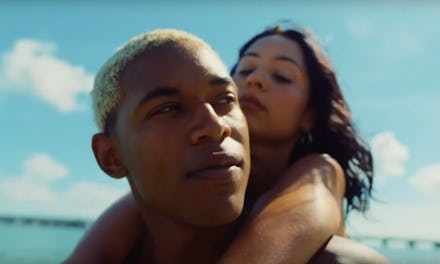How the director of 'Waves' constructed one of the year's most poignant soundtracks

If you’ve seen Waves, you’d know that the entire film hinges on its soundtrack. The story follows the story of a young family in Florida swept up in the kind of unexpected tragedy that becomes difficult to process – for the characters and the audience. The songs of the film provided an important cues for everybody. Trey Edward Shults, the director of the film, knew that too. He explained to The New York Times, that he filmed a few of the scenes with the songs he wanted before he even had the rights to them.
One of the pivotal scenes included music from Kendrick Lamar’s “Backseat Freestyle” played during a highschool bonfire party. Tyler (Kelvin Harris Jr.), the teen son, breathlessly rapped along to every single word with his friends. Watching felt like an encapsulation of what it felt like to be in high school in 2014 in Florida. Hot, confused, filled with angst, rage, and questions. The song made the entire moment specific. If Shults couldn’t get the rights to the song, he simply planned on cutting the scene.
Shults’s use of music is also what most critics latched onto about the film.
“This movie was risky in a lot of ways, and we just wanted to take a big swing and go for it,” Shults told the Times. “My backup plan if we didn’t get it was just going to be to cut the moment. It would have been awful!”
Alongside Kendrick Lamar, Shults also pulled five Frank Ocean songs, as well as music from Animal Collective, Tame Impala, Kanye West, and Tyler, The Creator. There is a scene in the second portion of the film where an Animal Collective song starts to play, as an afternoon storm starts to blow in. Half the sky is dark blue and grey, the other still blue. The grass looks unbelievably green. Emily (a brilliant Taylor Russel), the teen daughter, is staring out of the passenger window as the song hits its crescendo. It’s almost too Tumblr-era to work — but it does. It is a cliche that most of us can recall; a moment that included a similar framework when we were 17.
West’s “I Am a God” was the hardest to get. It plays over Tyler’s breakdown, the rawest, toughest part of the film. In the first round of negotiations, West fired his management team, who was brokering the deal. The second time around, West insisted that Shults use a clean version of the song — this was shortly after West had started his rejection of secular music, including his own. “I don’t even know if a nonexplicit version exists,” Shults told the Times.
But eventually, West and the other owners of the song approved. It’s hard to imagine what Waves would have been like if it hadn’t been rooted in such visceral and contemporary music.
“Those songs,” Allison Williams wrote for Vulture, “are essential to the driving sequences that make up the best, lushest parts of the movie, the ones where it feels like the film could lift off the ground and fly away.”
That’s part of what Shults intended. The soundtrack told its own story, and that’s where the strongest elements of the film shone. That’s not a particularly glowing review for Waves itself — it’s not Shults’ best film and the subject matter feels at once overplayed and underdeveloped. “If you separated all the tracks into a playlist, there’s a narrative, and an arc is being told from track to track that mimics the movie,” Shults told the Times. “But there’s a fine balance because if you do it wrong, it can be really on the nose.”
It wasn’t the music that felt really on the nose — perhaps the scene at the abortion clinic, or the final explosion in Tyler’s spiraling life, yes. But the music always worked. One of the biggest gets for Shults was the five Frank Ocean songs that played as a tender throughline.
“We didn’t allow them to see dollar signs,” music supervisor Randall Poster told the Times. “I think everybody knew going into it that we were going to spend a fair amount of money on the music, but what you try to impress upon them is that this is an artistic undertaking with a visionary director, and I think artists largely want to be involved in those kinds of projects.”
It wasn’t easy. Ocean initially rejected Shults pitch for all five songs. It wasn’t until he sent a letter to Ocean, as along with a rough cut of the movie, that Ocean approved. And not only did he approve, he approved the rights at a reduced rate. That was an additional blessing; Waves was produced by A24, a studio known for its low budget films.
“I don’t know what we would have done without Frank Ocean,” Poster said. “When we were able to get those songs, I think we breathed a huge sigh of relief: ‘O.K., we have really the emotional spine that we’ve been looking for.’”
That “emotional spine” is what keeps the film upright — the movie would have fallen flat without its soundtrack, feeling more like tragedy porn than anything moderately exploratory about life or love. And while it still didn’t hit those targets squarely, the music provided essential cues about when you should be crying, and why.